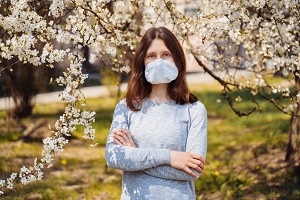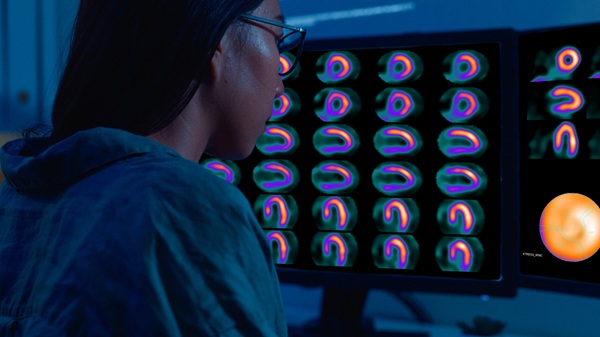Masks May Be Helpful Against Seasonal Allergies

DETROIT (May 24, 2021) – Masks have protected wearers against the COVID-19 virus throughout the pandemic. During this past flu season, they were credited with a dramatic reduction in flu cases, sparing hospitals from a potential twindemic. With allergy season upon us, could they also protect allergy sufferers?
Masks can be helpful, but they’re not a substitute for your medication, said Christian Nageotte, M.D., Service Chief of Allergy and Immunology at Henry Ford West Bloomfield Hospital.
“Several of my patients have noticed their allergy symptoms are not as severe in the last 12 months than in years previous,” he said. “There definitely is some common sense thinking that this is reducing their allergen burden by the filtration of the air they’re breathing. At this time, I support they continue to do that, wash their hands often and change their mask often, so it’s not acting as a clogged filter and keeping that allergen in close proximity to their nose.”
An estimated 19.2 million people in the United States have seasonal allergies, according to the Centers for Disease Control and Prevention. Hay fever, one of the most common, accounts for 12 million doctor office visits a year.
Masks can protect against seasonal allergies by preventing larger allergen particles from being inhaled. Inhaled airborne allergens such as pollen, fungal spores, and house-dust mites feces play a significant role in triggering IgE-mediated immunologic responses in typical allergic rhinitis symptoms. All of these particles are typically more than 2-10 mcm in size. Standard surgical masks filter particles larger than 3 mcm, and N95 masks can filter particles as small as 0.04 mcm.
A November 2020 study published in the Journal of Allergy and Clinical Immunology: In Practice found that nurses who wore standard surgical mask and N95 respirators reported a significant reduction in their allergic rhinitis symptoms. In a related study in the same journal in August 2020, researchers found that mask-wearing and other public health interventions led to reductions in rhinovirus, RSV and influenza.
Dr. Nageotte said while there is no harm in healthy people continuing to wear a mask if they feel it’s helping them, further study is needed to evaluate their efficacy before making it part of an “allergy action plan.”
He emphasized that allergy medications are proven to be effective for controlling allergy symptoms.
“People should continue to use their medicines and their inhalers to reduce the severity of their allergies and asthma,” he said. “It’s also important that people not to delay their care. Whether it’s an in-person office visit or a telemedicine visit, we want to be able to manage your symptoms proactively to avoid a potential visit to the Emergency Department.”
###
NEWS MEDIA ONLY may contact: David Olejarz / David.Olejarz@hfhs.org / 313-303-0606
About Henry Ford Health System
Founded in 1915 by Henry Ford himself, Henry Ford Health System is a non-profit, integrated health system committed to improving people’s lives through excellence in the science and art of healthcare and healing. Henry Ford Health System includes Henry Ford Medical Group, with more than 1,900 physicians and researchers practicing in more than 50 specialties at locations throughout Southeast and Central Michigan. Acute care hospitals include Henry Ford Hospital in Detroit, MI and Henry Ford Allegiance Health in Jackson, MI – both Magnet® hospitals; Henry Ford Macomb Hospital; Henry Ford West Bloomfield Hospital; and Henry Ford Wyandotte Hospital.
The largest of these is Henry Ford Hospital in Detroit, a quaternary care research and teaching hospital and Level 1 Trauma Center recognized for clinical excellence in cardiology, cardiovascular surgery, neurology, neurosurgery, and multi-organ transplants. The health system also provides comprehensive, best-in-class care for cancer at the Brigitte Harris Cancer Pavilion, and orthopedics and sports medicine at the William Clay Ford Center for Athletic Medicine – both in Detroit. As one of the nation’s leading academic medical centers, Henry Ford Health System annually trains more than 3,000 medical students, residents, and fellows in more than 50 accredited programs, and has trained nearly 40% of the state’s physicians. Our dedication to education and research is supported by nearly $100 million in annual grants from the National Institutes of Health and other public and private foundations.
Henry Ford’s not-for-profit health plan, Health Alliance Plan (HAP), provides health coverage for more than 540,000 people.
Henry Ford Health System employs more than 33,000 people, including more than 1,600 physicians, more than 6,600 nurses and 5,000 allied health professionals.
.svg?iar=0&hash=F6049510E33E4E6D8196C26CCC0A64A4)

/hfh-logo-main--white.svg?iar=0&hash=ED491CBFADFB7670FAE94559C98D7798)








